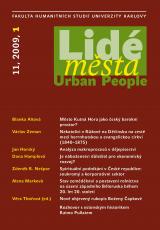Spirituální podnikání v České republice
Soukromý a korporativní sektor
DOI:
https://doi.org/10.14712/12128112.3675Klíčová slova:
sociology of religion, religious economics, spirituality, New Age, spiritual market, Czech Republic, 1993-Abstrakt
The paper contributes to the still underdeveloped field of studying religious and spiritual economies and markets dealing with goods that can be labelled as compensators by the rational choice theorists of religion (though the author does not accept the RCT theory in general). Field data are taken from two research studies unique in the Czech Republic, the first of which was devoted to the Czech (market with) spiritual literature, and the second to the socio-anthropological study of religion and spirituality in a medium-sized Czech city (Česká Lípa). Even if the author concludes that the level of Czech religiosity/spirituality is drawing near to the Western European level in the post-1989 years, both in terms of substance and volume, he maintains that there are still substantial contrasts between the two. Those Czechs who pay attention to spirituality are generally “self-oriented” and much less interested in anything “social” or “transcendental” than their Western European colleagues. Czech society has not yet witnessed the shift from “materialism” to “postmaterialism” (Inglehart) or from “individualism” to “subjectivism” (Taylor). Also, the most prosperous forms of spiritual business in the Czech Republic are those that are mostly commercialised, while any proposals from NGOs (and churches) are much less successful due to the very origin of the offers. At the same time, the majority of Czechs who oppose any church religiosity is very open to modern New Age spiritualities and various kinds of goods and services provided by the growing spiritual market, both domestic and international.
Stahování
Publikováno
Jak citovat
Číslo
Sekce
Licence

Tato práce je licencována pod Mezinárodní licencí Creative Commons Attribution-NonCommercial-NoDerivatives 4.0.


